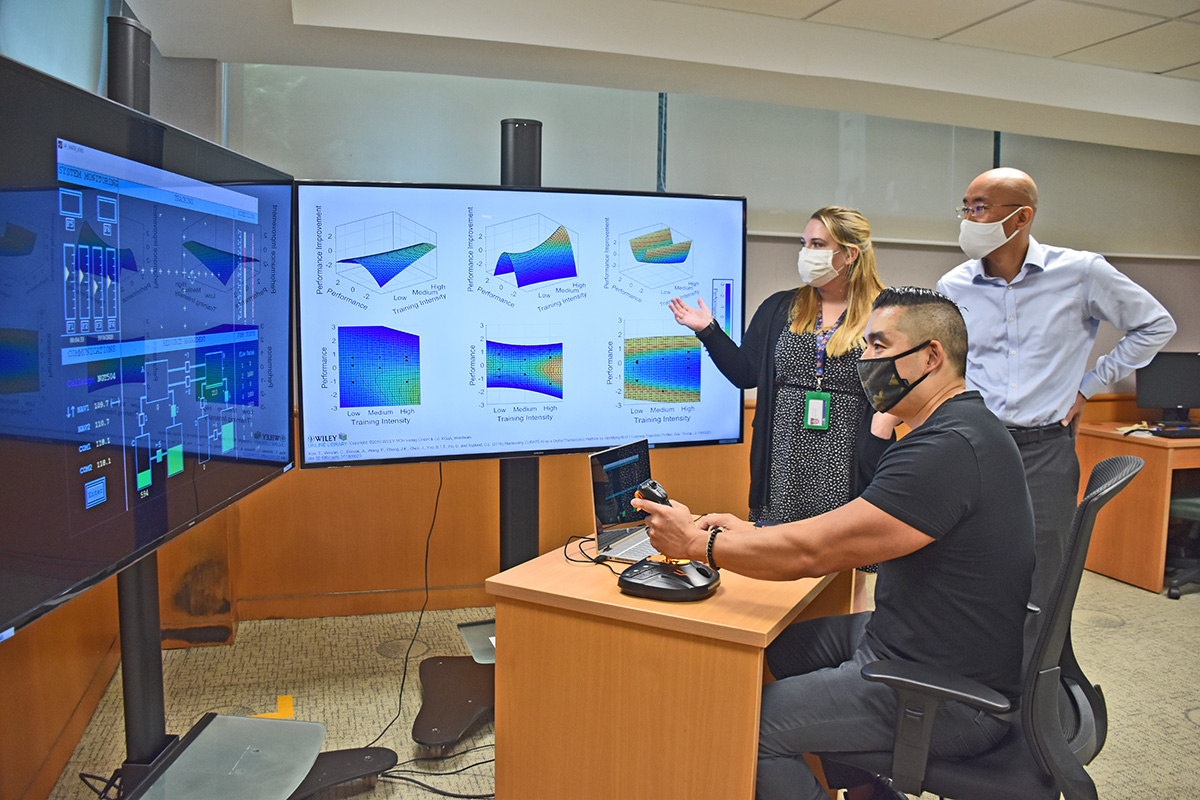
Issue 37 / February 2021
SCIENCE OF LIFE
Artificial Intelligence Enables
Single-Patient Clinical Trials

NUS Medicine’s Institute for Digital Medicine pilots novel N-of-1 (single subject) trial designs to improve patient outcomes with rapid and economical solutions.
he stuff of science fiction not so long ago, artificial intelligence (AI) is now powering a dynamic new range of customised, single-patient trials that are proving to be more effective than traditional, templated clinical treatments.
The trials led by the Institute for Digital Medicine at NUS Medicine and involving teams drawn from backgrounds as diverse as engineering, healthcare economics, behavioural sciences, computing, public health, and public policy, are helping to improve patient outcomes through rapid and economical solutions.
These outcomes are being achieved by the use of AI to integrate groundbreaking advances in medicine and digital technology. The aim—to drive revolutionary trial design protocols and targeted healthcare solutions that deliver faster, and more effective clinical interventions. The Institute (also known as WisDM) has thus far pioneered a way to pinpoint effective drug mixes against COVID-19, and developed digital therapies to address cognitive decline for post-brain radiation therapy and other oncology patients as well as other ageing and illness-related challenges.
Digital drug development for COVID-19
530,000
possible combinations
tested in 100+ experiments
over 2 weeks to arrive
at 1 optimal combination
Through an interactive digital platform called IDentif.AI (Optimising Infectious Disease Combination Therapy with Artificial Intelligence), which leverages AI to calculate the most effective combination of drugs and doses, the NUS Medicine researchers have found that the most optimal drug combination regimen against COVID-19 comprises remdesivir, lopinavir and ritonavir.
The IDentif.AI platform looked at a pool of 12 drugs that were selected based on their status of being under evaluation in multiple clinical trials. IDentif.AI differs from conventional AI approaches, and does not rely on using pre-existing data to train algorithms and predict treatment regimens. Instead, it designs experiments using different permutations of drugs and doses to crowdsource the live virus to determine the combinations that optimise anti-viral activity. At the heart of IDentif.AI is a powerful, AI-discovered relationship between drugs and doses to efficacy and safety using a quadratic algebraic algorithm. This allows for the optimal combination, which resides among more than 530,000 possible combinations to be identified with only a few hundred experiments within two weeks. Through the platform’s ability to leverage unforeseen drug interactions within each combination, optimised recommendations for the drugs and corresponding doses were then suggested. Results from the IDentif.AI platform have been observed independently from a team of international collaborators on another strain of SARS-CoV-2, and two study protocols have been cleared to enable clinical studies should they be needed.
At the heart of IDentif.AI is a powerful, AI-discovered relationship between drugs and doses to efficacy and safety using a quadratic algebraic algorithm.
Professor Dean Ho, Director of WisDM, said, “We need rapid and economical solutions, and the IDentif.AI allows for digital drug development for COVID-19. Even as the world continues to race towards vaccines, leveraging on AI can potentially open up a new pathway to accelerate the search for an accessible and optimised intervention that may help take the strain off healthcare systems.”
Novel trial designs for digital oncology
Through another AI-derived technology platform, CURATE.AI which provides actionable N-of-1 (i.e. single patient) combination therapy for the entire duration of patient care, trials are customised based on individual profiles, to develop drug therapies and interventions that achieve better outcomes for patients. Dynamically adjusting drug doses, CURATE.AI sustains the optimisation of combination therapy as patient responses are recorded.
AI-derived technology platforms and programmes
IDentif.AI
CURATE.AI
In a previous pilot clinical study conducted in collaboration with a US-based hospital, a patient with advanced prostate cancer was recommended a 50% reduction in dose of an investigational inhibitor drug for increased efficacy. The patient subsequently resumed an active lifestyle as the lower dose also proved to be more tolerable. Another patient in Singapore with advanced cancer who was prescribed a reduced dose of nab-paclitaxel saw his lung tumour shrink while also maintaining a stoppage in progression of the cancer. This has further allowed the patient to continue treatment for a much longer duration compared to most patients who are being given this drug. These findings have led to a clinical pilot trial that is currently recruiting patients1.
Findings have led to a clinical pilot trial that is currently recruiting patients.
Assistant Professor Raghav Sundar from the Department of Medicine and WisDM at NUS Medicine, and Consultant with the Department of Haematology-Oncology at the National University Cancer Institute, Singapore (NCIS) said, “In the current clinical context, the doses of chemotherapy drugs given in combination can be further optimised. Drug dosing in cancer treatments are typically based on the degree of side effects experienced by the patient. With CURATE.AI, each patient’s recommended dose is calibrated using clinical data generated from their individual response to treatment. This may redefine how we care for patients and leverage digital medicine to treat cancers.”
Medicine without the pill
In another expanded study using CURATE.AI, the team leveraged software as therapy to address ageing and illness-related challenges in cognitive and physical performance, such as diabetes, cognitive decline and Alzheimer’s disease. Using the subject’s own input data (e.g. training intensity, current performance level) and output data (e.g. degree of improvement), a personalised three-dimensional (3D) profile can be constructed to identify how different subjects perform under different intensities.
“Conventional learning approaches involve training on the same intensity or a paced increase in difficulty. However, these training regimes do not often result in the optimal outcome in every subject. In the context of digital therapy, CURATE.AI can create individualised profiles so that training may eventually be customised to improve performance,” said Prof Ho.
“The biggest tragedy that can happen with a one-size-fits-all approach is that we lose against the disease. We believe the future of healthcare lies in AI, and using N-of-1 trial designs allows us more time to innovate, so that we don’t miss out on what is truly necessary to bring about better patient outcomes.”
Prof Dean Ho, Director of the Institute for Digital Medicine
Moving forward, the team has received funding and clearance for a clinical study to assess a digital therapeutic addressing cognitive decline in patients who have received radiation therapy to the brain. This study design will pair CURATE.AI with dynamically changing intensities of the software to provide diagnostic information regarding each patient’s responses. These responses will in turn be used to personalise treatment. It is envisioned that this study will eventually lead to a therapy that can be remotely deployed in patient’s homes.
Digital medicine for good
Beyond clinical diagnosis, the WisDM team aims to leverage AI and digital solutions to build sustainable and cost-neutral methods and treatments that can be deployed by all communities globally. Challenging the status quo early, their work centres on precision testing enabled by N-of-1 trial designs that have proven more effective than standardised clinical trial methods.
“The biggest tragedy that can happen with a one-size-fits-all approach is that we lose against the disease. We believe the future of healthcare lies in AI, and using N-of-1 trial designs allows us more time to innovate, so that we don’t miss out on what is truly necessary to bring about better patient outcomes,” Prof Ho added.
Delivering research aligned to national priorities
WisDM is one of nine new Translational Research Programmes (TRPs) at NUS Medicine aimed at creating a strong and coherent scientific base to deliver impactful and meaningful research outcomes for the School and Singapore’s health system. Besides digital medicine, the other areas are Cancer, Cardiovascular Disease, Healthy Longevity, Human Potential, Immunology, Infectious Diseases, Precision Medicine and Synthetic Biology. These nine key focus areas, which are multidisciplinary, and health and disease-based will create greater synergies and collaboration between basic scientists and clinician scientists, strengthen programmatic research and deliver research outcomes to address clinically relevant issues and applications that are aligned to national priorities.
-
More information can be found at: https://clinicaltrials.gov/ct2/show/NCT04522284




